

Want to learn about Agile values?
The Agile approach is one of the most efficient ways to build products.
But Agile isn’t just about organizing sprints and updating Agile boards.
To implement the Agile methodology, your team must follow some core Agile values as well.
These values bind your team together, just like our favorite study group from the show Community!

We’ll use examples from Community in this article to introduce you to the 4 core values of the Agile approach. We’ll also highlight the best Agile project management software to help you adapt to the Agile method quickly.
So bring your study group along, because everyone’s welcome in this Community!
What Are Agile Values?
Agile values are the four guiding traits outlined in the Agile Manifesto, the guiding document for Agile projects.
They are:
- Individuals and interactions over processes and tools
- Working software over comprehensive documentation
- Customer collaboration over contract negotiation
- Embracing change over following a plan
Note: If you want to learn more about the Agile method, jump to this section.
However, Agile values aren’t just rules you must follow to complete your project.
After all, the Agile movement isn’t like Senor Chang’s Spanish class in Community, where you get pulled out of the class for giving the wrong answer!

Instead, these values will develop an Agile mindset that’ll help a software developer achieve better results, faster. So, while they aren’t binding, these values are strong reminders of what the Agile methodology stands for.
And what is that, you ask?
Let’s find out…
Note: If you already know the ins and outs of the Agile method, and only want to learn the Agile values, click here to jump to the section covering them.
What Is Agile Project Management?
The Agile approach is a modern software development and project management methodology that emphasizes adaptability and efficiency.
In fact, the Agile practice is popular for boosting the efficiency and collaboration of software teams, helping them deliver customer-centric products quickly.
In short, it’s something that Senor Chang needs to consider while on the job!

But what does the Agile development process involve?
Let’s find out…
How does Agile work?
The Agile method helps teams coordinate better and deliver results faster than if they were using a traditional project management methodology like Waterfall.
Here’s an example to help you understand the difference between Agile and Waterfall:
Let’s say you’re part of a software developer team with an Agile mindset.
Your team is building an app for the Greendale study groups. The final product should help the group manage their study sessions.
Instead of delivering the complete app in one release (like in traditional methods), you would split it into several small releases, each having a short development cycle (known as a sprint) of two to four weeks.
After each sprint, your team will submit a version of the app to the study group for feedback.
Better watch out for some sharp feedback from former jock, Troy:

When your developer team works in tandem with the customer, you’ll soon have an awesome product that fulfills all their needs!
But to make this happen, you need to follow the 4 Agile values and 12 principles outlined in the Agile Manifesto.
The 4 Core Agile Values
The Agile manifesto is a minimalist document that only delivers the essence of the Agile framework. But its real meaning (and everyday application) may be a little too hard to spot for the likes of Chang.

Which is precisely why we’re covering each value in detail!
Here’s how the Agile manifesto values apply to your Agile organization:
Agile value #1: Individuals and interactions over processes and tools
From filling out forms for project approvals to applying for permission to use the conference room, every company has a way of getting things done.
Sure, these could be effective management tactics in their own way.
But sometimes such processes prevent agility in the team.
And when that happens, only direct conversations can solve the problem.
Especially if ex-lawyer Jeff is the one who’s talking.

The creators of the Agile framework recognized the power of people and interactions in speeding things up. And as a result, the essence of any Agile process will have some human element to it.
Take the task of understanding the customer’s needs, for example.
Sure, you can ask them to fill out a standard form. But that form alone won’t be able to capture all their requirements correctly.
Why not interact with them directly, instead?
You’ll be able to clearly understand what they need in the final product and clarify any concerns or issues easily!
Additionally, to fully make use of the team’s potential, an Agile organization needs to put their team’s capabilities first. I mean, at the end of the day, they’re the one who’s responsible for the development process!
That’s why Agile practitioners are discouraged from overly depending on processes and tools. Instead, rely on individuals and interactions!
Agile value #2: Working software over comprehensive documentation
With Dean’s love for paperwork, he would fit right into a traditional project management setup.

However, in such a setup, reams of paperwork may or may not lead to anything concrete.
Additionally, it takes up crucial time that could have been invested in building valuable software instead.
That’s why the Agile methodology recommends something better to replace useless paperwork: the product itself!
Agile practitioners present a version of the working software to their customers nearly every two weeks. While this helps you get their feedback, you’ll also be able to meet your deadlines.
However, this doesn’t mean that the Agile process does not give importance to documentation. But in the face of a crushing deadline, working software will always trump detailed documentation.
After all, you can always document things later, right?
Agile value #3: Customer collaboration over contract negotiation
If an Agile organization and its customers simply outlined everything to be done beforehand, it leaves little scope for improvisation for the software developer.
This goes against the very grain of Agile development.
Without close customer collaboration, a developer can lose sight of their vision.
And when the final product is ready, customers may not react as favorably as expected.
They’ll be like Troy here:

Instead of negotiating such contracts, Agile practitioners are advised to collaborate with the customers at every level of the development process.
For example, if you’re following Scrum, the Scrum master should regularly include the customer in sprint review meetings, user testing sessions, and focus group discussions.
Sure, this speeds up the software development process because of the multiple customer inputs the software developer team receives.
But more importantly, the Agile practice gives teams the time and space to realign themselves to customer needs better and develop valuable software for them.
Agile value #4: Embracing change over following a plan
Most people believe that change is expensive, cumbersome, and must be avoided at all costs.
But as Senor Chang puts it:

That’s right! Change, just like Chang, is inevitable.
And Agile teaches us to embrace it (and him!).
Because life is unpredictable and crazy things can derail your project.
Like your school being taken over by an evil dictator-type security guard.

Similarly, your initial assumptions for the project or the customers’ needs could change any time.
This would be impossible to deal with under traditional project management constraints.
For example, you started off assuming that you’re making an app for a six-member study group. But with Chang’s takeover, there may be no study groups left at Greendale Community College!
However, with the Agile practice, you have review meetings and other opportunities to adapt to such changes without jeopardizing your project.
Although, with Chang around, you may want to rethink your business priorities altogether!
The 12 Agile Principles
The makers of the Agile development method didn’t just stop at developing values.
They also gave us 12 Agile project management principles that clarify what the priorities should be for an Agile team.
Hopefully, this should help you avoid confusion like this in your Agile organization:

Here’s a quick look at each Agile manifesto principle to help you hone an Agile mindset.
(We’ve categorized each principle into 4 distinct groups to help you understand their essence better.)
Group A. Agile project management principles about customer satisfaction
- Prioritize customer satisfaction, above all else. Deliver on your promise to them by providing them with high-quality software within the deadline.
- Say yes to changing requirements, even at the last minute. Agile processes harness change and help you create valuable software for your customers.
- Keep delivering often; preferably every couple of weeks or months. This helps you get customer feedback regularly to adapt the product or software accordingly.
Group B. Agile project management principles about quality
- To determine the success of your development processes, focus on how well your working software satisfies customers.
- The Agile process is based on a test-driven development process. To implement this, ensure that your team has the resources needed to maintain a steady pace.
- Continuous attention to technical excellence and good design enhances agility to help you meet customer needs perfectly.
Group C. Agile project management principles about collaboration
- Project stakeholders and your developers must work together regularly. This helps your team actively collaborate for continuous improvement.
- Build projects around motivated team members and give them the support they need. Always trust them to do the right by the job.
- Encourage members to have more face-to-face conversations as it’s the most reliable and efficient way of conveying information.
- Support your team to self organize and work without supervision. The best kind of work emerges from such teams.
Group D. Agile project management principles about team management
- Keep your processes simple and get rid of non-essential work. This is the very core of an Agile project.
- Constantly evaluate your team’s performance to fine-tune them into a better, efficient team
Each Agile principle (when followed, of course) will surely help you develop a product that meets your customers’ needs perfectly.
In any case, an Agile principle will be way more effective than the experiment to prove the infamous ‘Duncan Principle’!

How To Manage Your Agile Projects Efficiently
An Agile development project is like a game of paintball.
To succeed at it, you need agility and collaboration.
Each Agile value and principle in the Agile framework will lay the foundation for your project success.
But that’s pretty much it.
How can you actually manage your Agile project now?
Luckily, you have powerful project management software to help you out!
Traditional, out-of-date project management software may be good enough for the Dean’s office, but they won’t fulfill your Agile project needs.
After all, Agile is all about change and agility!
That’s why you need an excellent Agile software development project tool like ClickUp by your side!
But what’s ClickUp?
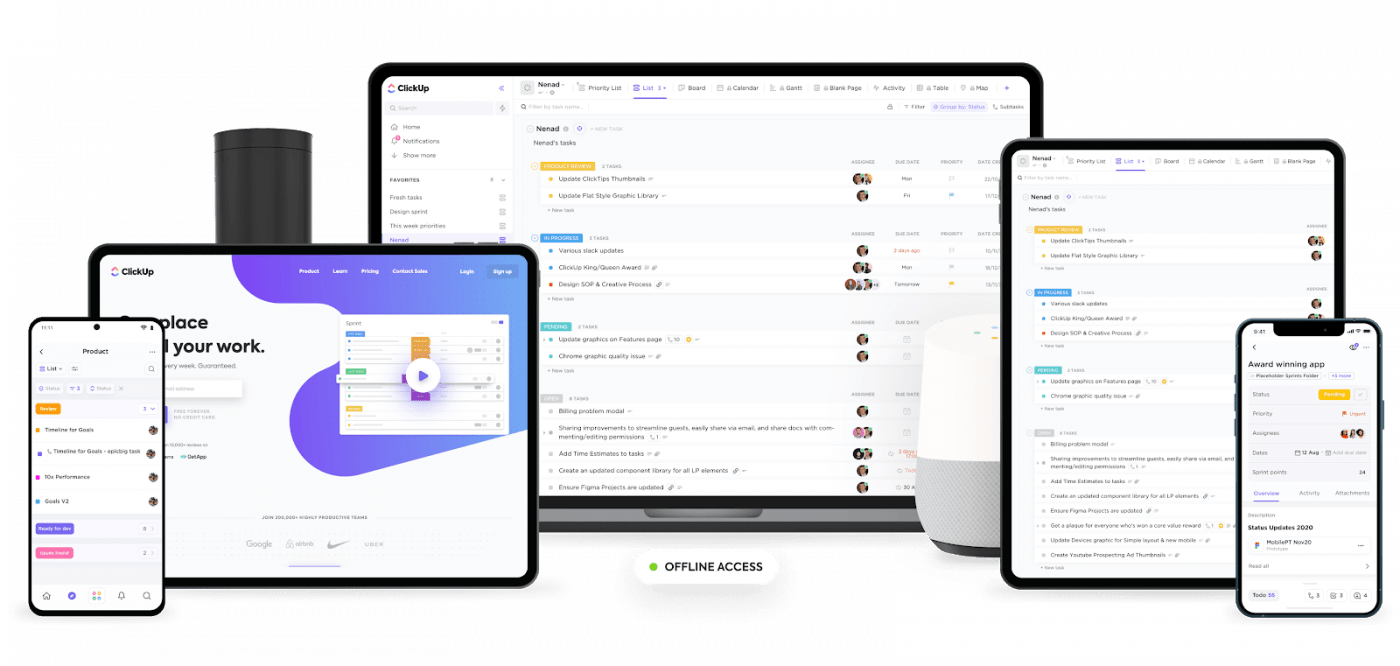
ClickUp is one of the world’s leading project management tools that’s used by teams from startups to tech giants all over the world.
With a wide variety of Agile software development and collaboration features, it’s got everything your Agile team needs!
The best part?
It’s super easy to get started with ClickUp.
You won’t need a book for it, Dean!

Here’s how ClickUp’s features support successful Agile product management.
A. Manage sprints with Sprint Lists
Sprinting would be a useful skill to have when playing paintball at the Greendale Community College.

But an Agile project requires completely different kinds of sprints.
Sprints are short development phases (each lasting 2 to 4 weeks) that conclude with showing a working product to the customer.
As each sprint contains as much action and excitement as a typical paintball game, it can be hard to track their progress.
But not with ClickUp!
ClickUp’s Sprint List is a simple checklist that divides each sprint into small tasks. Each time you finish a task, you can quickly check it off from the list!
You can create a checklist for all your Agile projects, tasks, subtasks, and even your user stories. You can also add Scrum points to a list to gauge the time you’ll take to finish the backlog items.
The best part?
You can use the Sprint List during various Agile meetings, like sprint review, to discuss sprint progress easily!
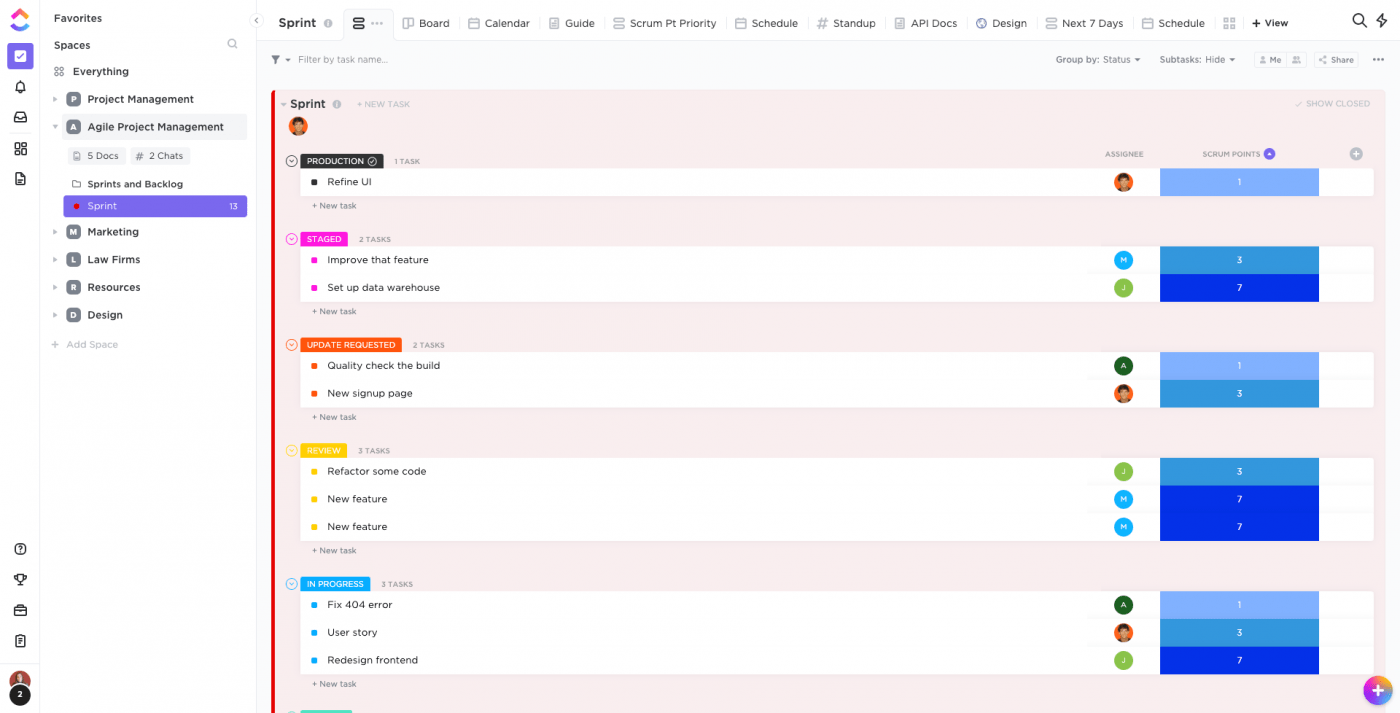
B. Get high-level overviews on customizable Dashboards
The Greendale study group has a super sturdy table that keeps them together.

An Agile team, especially one working remotely, needs something as reliable and accessible to manage things and increase their team’s agility.
And that’s exactly what you get with ClickUp’s Dashboard feature!
It’ll give you quick visual summaries of the whole project to ensure that things are proceeding according to plan.
You can even customize your Dashboard with sprint widgets such as:
- Velocity Charts: highlights your task completion rate
- Burndown Charts: shows the amount of work remaining in a project
- Burnup Charts: displays the amount of work already completed in a project
- Cumulative Flow Charts: shows the task progress over time
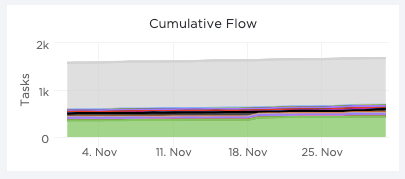
C. Use the Comments Section to collaborate effortlessly
Film nerd Abed has had his troubles with communication in the past.

But an Agile project requires all team members to constantly communicate with each other, even if they work remotely.
Luckily, ClickUp facilitates team conversations with its Comments section.
You can use it for:
- Detailed conversations: regarding a specific task, activity, or assignment
- Tagging team members: to alert them of important comments
- Sharing documents and files: to give your team what they need to progress with their work
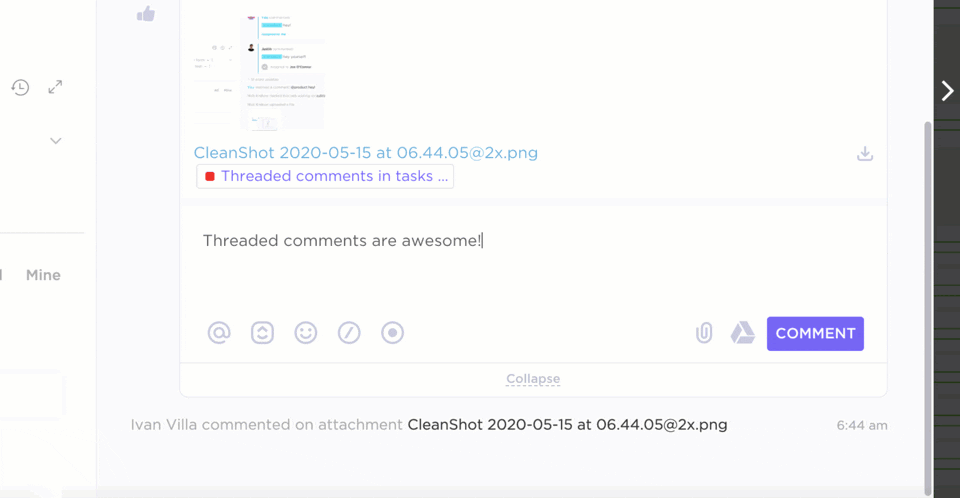
We know what you’re thinking.
Won’t Abed have to go through all those comments just to see what he’s been tagged in?

With ClickUp’s Assigned comments, he won’t have to!
You can convert any comment into a task and assign them to yourself or another team member! ClickUp notifies the assigned team member and even displays the comment in their task tray, ensuring that it stays on top of their mind.
Once they’re done with the task, they can simply resolve the comment to avoid needless follow-ups.

D. Custom Access Rights to bring stakeholders into your project space
Abed knows that the real action takes place behind the scenes.
He even gives us a sneak peek behind the Dean’s film with some interesting footage like this:

Similarly, the ‘making’ of an Agile project can be more interesting than just the end result. And an Agile team is encouraged to include their customers at various development stages (value #3).
To make this happen, ClickUp lets you share Custom Access Rights with them.
This lets you share your project files, folders, and task lists with anyone within and outside your network.
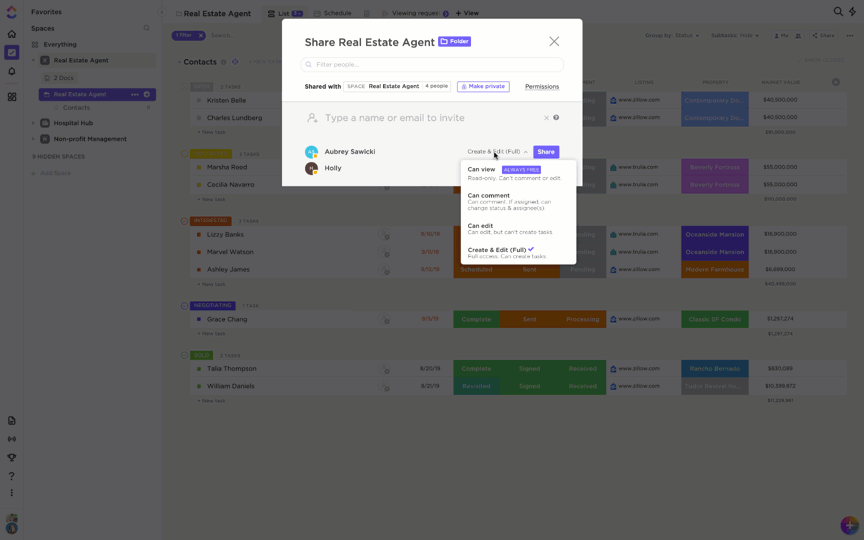
But you still retain complete control over everything they can do once inside. Just go ahead and set their ‘permissions’.
Here a few types of permissions you can set for people outside your team:
- Can view: can view project details but won’t be able to interact
- Can comment: can only comment on the tasks and task lists
- Can edit: can’t create tasks but can edit them
- Create and edit: can create their own tasks and subtasks
- Can delete: can delete tasks that they did not create
We hope this allows you to make an Abed-esque documentary of your project!
E. Track project progress with Gantt Charts
Abed’s mind is a supercomputer that can remember thousands of movie references and track parallel timelines.

But the rest of us mortals have limited abilities.
There’s no way for you to manually track the hundreds of tasks, subtasks, and deadlines in an Agile project!
Luckily, ClickUp’s Gantt Charts will do that for you.
It gives you an all-round overview of your software development process in a color-coded, easy-to-use interface!
It can also automate various project processes in real-time.
- Automatically readjust Task Dependencies after you reschedule any task
- Instantly calculate your project completion percentage based on completed tasks vs. total tasks
- Compare current vs. expected progress in your planned project schedule
- Instantly calculate your project’s Critical Path to know what tasks you must complete to meet deadlines on time
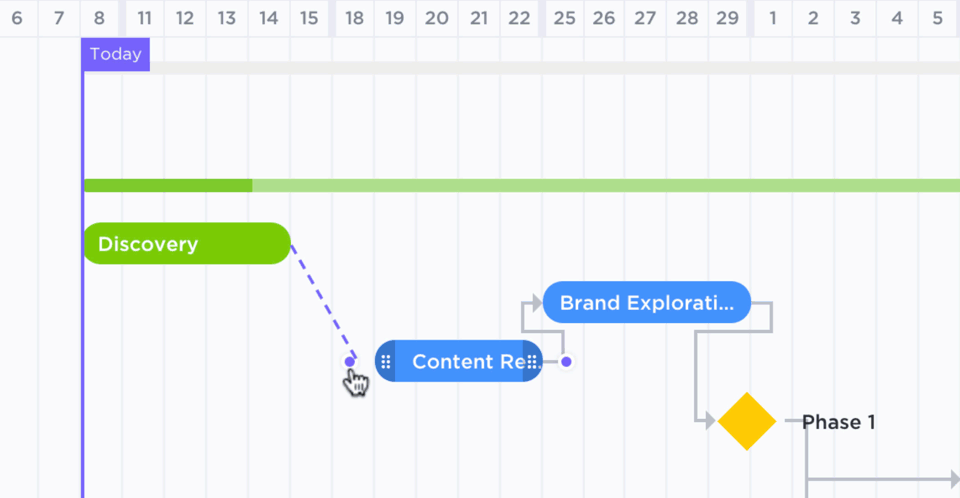
But these aren’t all of ClickUp’s features.
There’s far more where that came from!
ClickUp also offers some other awesome Agile project management features such as:
- Native time tracking: use the Chrome extension to track time usage on per task
- Goals: split your sprint goals into easier to achieve Targets
- Multiple Views: choose from various project views like List view, Board view, Box view, Calendar view, and Me Mode
- Priorities: attempt the most important tasks first
- Weekly Scorecards: track your developer team’s objectives and goal progress quickly
- Custom Statuses: create project-specific statuses for your tasks
- Pulse: know what tasks your team is most active in during a period
- Project Management Automation: automate repetitive project processes to save time
Conclusion
The Agile project management methodology can dramatically improve results in software development and other projects.
So if you’re switching to the nimble-footed Agile method, you must follow the Agile values and principles to scale new heights in project success.
Just like what Troy and Abed did when they revolutionized blanket fort-making!

But you can’t deliver products that meet your customer’s needs using clunky, old project management tools.
What you need is a modern, Agile software development project tool like ClickUp!
It has all the features to enhance speed and transparency, making it the perfect software for Agile project management.
Sign up for ClickUp today to help your team achieve project success in style — no matter where they are!




